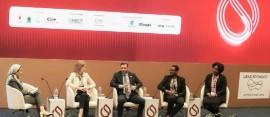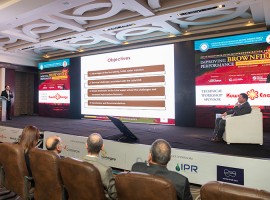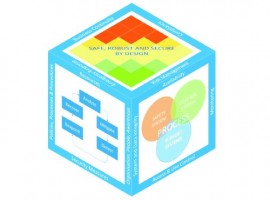By Amira S. Badawey
The Egyptian governmental entities the Egyptian Natural Gas Holding Company (EGAS), the Egyptian General Petroleum Corporation (EGPC), and the Egyptian Petrochemicals Holding Company (ECHEM) founded OGS with a mandate to develop skills of people working in the oil and gas sector. OGS has built up a massive portfolio and focuses on “technical and non-technical skills in all segments starting with drilling, exploration, geological studies, all the way to downstream activities, and production, as well as refineries and petrochemicals, all segments within the petroleum sector,” as Eng. Badr described the scope of organization’s work.
Oil and Gas People Development
OGS offers training services, annually schedules standard programs, as well as customizes training programs according to companies’ developmental needs that are specified through competency assessments used to identify areas of improvements.
OGS further collaborates with various universities as a significant number of instructors come from academia. The company has agreements with Cairo, Ain Shams, and Suez Canal universities, as well as other agreements with the private institutions such as the American University in Cairo (AUC), Future University, and the British University in Egypt (BUE). Under the terms of these agreements, OGS qualifies university students in order to augment their skills with specific competency required by the industry.
The subjects that OGS delivers are not available through graduate studies, among them are piping engineering and project management, as well as geological work in drilling and exploration. Currently, OGS is working with Cairo University on creating a special program for calibers working in other underdeveloped disciplines such as renewables and nuclear energy. Furthermore, OGS provides certification like Project Management Professional (PMP), and is in the process of renewing a memorandum of understanding (MoU) with the French Institute of Petroleum (IFP) on petroleum specific certification programs.
Eng. Badr explained that OGS has quite a unique position within the market due to the availability of simulators that are used in upstream training. OGS has full size physical simulators, drill cell that is used to train drilling engineers. As a result OGS is eligible to provide international certificates such as WellCAP from the International Well Control Forum (IWCF), and WellSHARP from International Association of Drilling Contractors (IADC).
Over the years, OGS has expanded its regional presence, as the company has set up a branch in Iraq and has won several contracts across the country for environmental studies and training. Iraqi calibers even came to Cairo to attend OGS training programs. Furthermore, OGS has an agreement with the Arab Petroleum Institute, with previous work in Sudan, and a current MoU for geological work in Chad.
Overcoming Challenges
Like most companies, OGS has been facing certain challenges associated with Egypt’s dynamic economic and political environment, in addition to industry specific difficulties, namely the decline in global oil prices. Accordingly, foreign partners in Egyptian oil and gas joint ventures restrict investments in such difficult times. Eng. Badr said that “whenever they cut costs, they start with the easiest thing, which is usually the training.” Yet, he added, “this will be for a temporary period because IOCs [international oil companies] are aware of the importance of training.”
In light of restricted investments, OGS collaborates with sector companies to maintain the skill levels of individuals. Geologist Mostafa El Bahr noted that “there are some activities that will be impacted by restricted investments because when there are budget cuts, the foreign partner delays all exploration activities because they carry a high risk, but he cannot delay production activities because this will directly impact his income.” OGS Chairman, Eng. Badr clarified that demand for upstream development programs may decrease, while, “there are certain programs that have a steady demand. For example, currently, Project Management is in demand and downstream development programs [as well], to a certain extent.”
OGS as an independent entity necessarily encounters challenges in the training market when it comes to alternative training schemes. Eng. Badr stated that OGS faces fierce competition with other training firms, as well as oil and gas companies themselves, because they might offer some in-house services via their Human Resources (HR) departments, which have lower overheads and can therefore offer training and development activities at lower prices. He added: “This represents a challenge for us in setting a competitive price that is comparable to the market price, as well as cover our own costs and overheads.”
Even some smaller companies started organizing and offering their internal training services at lower prices. Eng. Badr commented on the situation saying that despite the subpar quality of such service providers, “these providers reduce the price of training to unreasonable rates. We must be able to compete within the market as it is, therefore, we are examining market prices and reviewing our prices regularly.”
However, Eng. Badr stated that at OGS, the majority of instructors come from an oil and gas background. “This is what differentiates OGS. It is one of our strengths. They [the instructors] provide the knowledge plus practical experiences. For a course on instrumentation, for example, we can get a University professor who lectures on instrumentation from an academic perspective. OGS’ instructors who come from within the sector are experienced in various application issues. They had experienced how to troubleshoot and they know what can happen during practice, and can, therefore, transfer part of their practical expertise to the trainees.”
Another challenge is the shortage of USD, as OGS uses hard currency for payments to international certifying bodies, in addition to software and hardware updates for simulators, and the purchase of maintenance contracts and new hardware. OGS struggles to source USD for such payments, especially when customers, namely oil and gas companies, face a similar financial dilemma.
OGS’ Strategic Direction
In light of these challenges, Eng. Badr opted for a new strategy. Upon joining OGS, Eng. Badr created a business development committee tasked with conducting a strengths, weaknesses, opportunities, and threats (SWOT) analysis for the company, in order to envision a new OGS’ strategy.
Accordingly, OGS separated the marketing function into an autonomous department in order to expand its outreach on various levels. “We will focus on customer satisfaction and service quality, we have plans to significantly enhance them. We are developing our marketing team that will be responsible for handling customers and providing us with feedback on the market so we can take necessary corrective and preventive measures,” Eng. Badr revealed in the interview.
Furthermore, the company will focus on introducing new services such as certified lifting and welding inspection, as well as geological services. Eng. Badr added: “We are diversifying in services to decrease the company’s risk.” OGS’ Senior Consultant, Geol. Bahr added that OGS has added new services, such as Data Security to its portfolio, which is concerned with securing operating systems used in oil and gas fields, and hacking prevention. Eng. Badr clarified that OGS is in the process of preparing a project to develop this service. “I believe that companies will be more keen on getting these services, because the harm that could come from a deficiency in such services is greater than any investment required to establish them. That’s why we are confident that this project will proceed accordingly.”
In addition, OGS will focus on expanding its market presence. Eng. Badr said that “the closer we get to actual operations and production, the better we can devise economical pricing schemes and, therefore, companies can send more trainees to participate in our developmental programs. This will be a Win-Win for OGS, the oil and gas companies, and the people working in the field.”
Accordingly, OGS had planned for a roundtable at the end of November in Port Said to launch OGS’s new branch to service about 22 oil and gas companies operating in the city and in neighboring Damietta, in addition the Petrobel’s giant Zohr development. The objective of the roundtable is to bring together managers related to operation and production in order to get their feedback on training needs.
OGS Head further added that “we will extensively expand to external markets, especially in Iraq, because it is an important market. OGS already had operations with Africa for a long time, but there were some disturbances, after 2011, so we are looking into reviving our African work.” In that vein, OGS has gathered a team of experts who will periodically meet to review all provided courses and training material to ensure that it is up-to-date and meets a certain level of knowledge content that matches latest technologies and know-how in the field. Eng. Badr explained that, “they [the appointed experts] will provide OGS with advice on the existing training portfolio and on anything new we can introduce to our services.”
OGS’ Legacy
OGS has been training thousands of employees within the sector, as well as qualifying the majority of Board Chairmen. Eng. Badr stated that “this is an important achievement because there was a drop in management calibers within the sector due to retirement and unavailability of second-line managers. We qualified a number of leadership calibers. I, myself, am one of those calibers who were qualified by OGS development programs.” OGS also focuses on qualifying board members through customized programs to enable them to become more effective in their positions.
Eng. Badr concluded that “there are a number of projects in petrochemical, refineries, and gas discoveries that are under development. Once these projects are completed they will have significant value added and returns.”
He drew on previous experience. In his view, “before, the sector was concerned with exporting raw material, crude oil and gas, however, today, the sector is focusing on value added activities to cover domestic needs of derivatives as well as to export these products. The country has a lot of development programs, and energy is needed in order to achieve industrial and commercial development.” Having shifted the strategy “will in turn help the country achieve savings and boost income for Egypt,” he noted.
There is no doubt that energy will remain one of most critical aspects of Egypt’s economic development. As Eng. Mohamed Badr eloquently stated, “the oil and gas sector will have a significant impact on the country’s progress because it is a major industry. Renewables and such are alternative sources of energy, but the main source will continue to be hydrocarbons.” Therefore, Egypt will continually have a need to develop its oil and gas people.








